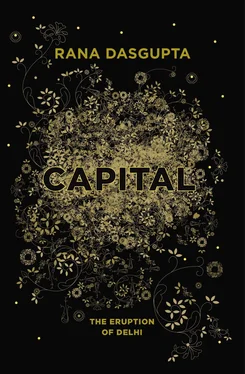The financial gains that the middle classes made distracted many commentators from the increasing dislocation they felt in those years, from the controlling apparatus of their society, and from the lurking discontent that ensued, even among otherwise thriving people. That they lived in a society controlled by oligarchs was itself a significant factor in their quality of life, for this fact troubled their mind and sapped their energy more than one might expect. They did not know anymore what to believe about the place they lived in, and it became bewildering to them, and laced with threat. Everything seemed to be an optical illusion created by Mephistophelian magicians to mask their own dark purposes — but what these might be it was impossible to know. Delhi became a surreal place to live, because as time went by people lost their faith that the purported nature of anything was the true one. They knew their society not through what they could see and read but through what they speculated or dreamt on fevered nights. Middle-class people worked and prospered in this society, but they had no image of what, who, how or why it was, and this left them fretful and unmoored. By the end of the decade there had begun a mass movement of protest and petition aimed at breaking the stranglehold of the shadowy elite. Corrupt power became the number one resentment of middle-class people, not only because it sucked money and resources out of their own economy, which it certainly did, but also because it denied them any sense of their own reality: the world they operated in was not the real world and they seemed to flail, Matrix -like, in empty space.
But this resentment of the oligarchs alternated, in middle-class life, with their own fantasies of total wealth and power — for it was difficult to believe in any other route to freedom. The middle classes did not generally entertain mild, democratic sentiments. ‘Middle-class contentment’ was anathema to them too. They were a ravenous class of people, and they read newspaper stories of their neighbours’ billion-dollar fortunes not just with resentment but also with jealousy. They repeated tales of astronomical sums of money with a curious kind of relish, and in their imaginings the power of corrupt politicians reached superhuman, diabolical proportions. They did not believe that power and money would ever be equitably distributed in their society. They felt that the middle-class life would always be one of servitude and illusion, and only the super-rich were in a position to really see what this whole story was about. But since money floated free of intelligence and hard work, since there was widespread disbelief that those who had it were more qualified for it than anyone else, it was also possible to believe that it would one day just pour in to one’s own life, too, unannounced. The conclusion that many people drew from the distribution of wealth in their society was that fortune, in every sense of that word, was totally random — a conclusion which made hard work seem slightly less meaningful, and which fuelled hopes of low-probability, high-value windfalls. People who earned $400 a month felt it was worthwhile deciding which Mercedes they would buy if things came to that.
• • •
My first conversation with Anurag happens in a bar. Afterwards he calls me to say, “I can’t talk in bars. If you want to hear what I feel, you have to follow where I go.”
We arrange to meet again. He asks me to pick him up by the side of a main road. Despite the nocturnal neon haze, I easily recognise his six-foot form kicking desultorily at the kerb as I approach. I pull up and he gets in. He directs me to where he wants us to go. Within a few minutes, however, he changes his mind.
“Stop the car,” he says. “I’ll drive.”
We change places, he slides back the driver’s seat to accommodate his long legs, and he pulls away at enormous speed.
“It will take us all night if you drive,” he says.
He parks outside a dilapidated concrete market and we go inside to buy liquor. Some twenty men are jammed together against the counter, waving tattered banknotes in the air. It is already late, the store is about to close, and more men are hastening down the steps. It’s winter, so most of them wear woollen hats. The liquor store is the only one still open: long, dirty corridors of shuttered shops stretch away in every direction.
There are used condoms discarded all around. This city has numberless people without homes, and so many more who cannot use the homes they have for sex. I’ve never been anywhere where the streets are so filled with post-coital detritus.
We emerge with a bottle each of rum and vodka, and stop outside to buy Coke. Anurag then drives us to Nehru Park, a large expanse in the diplomatic enclave which, by this time, is shut. We climb over the fence and follow the paths, which are shadowy and mysterious under the trees and the full moon overhead.
“Before I gave up eating meat,” says Anurag, “I used to buy chicken kebabs and bring them here to eat in the middle of the night. With my vodka.”
“On your own?”
“Yes. Sometimes the cops used to come and make problems. But the watchman liked me and he would keep them away.”
He leads us to his favourite bench. We lay our bottles and plastic cups out on it. It’s freezing cold, and I hug myself as I sit down.
The watchman hears us and comes out of his shack. He looks about seventy years old and walks with a stick. He is blind drunk. He’s happy to see Anurag and asks if we need an extra chair. We decline.
“I’ll come for a drink later,” says the watchman, slurring. He shuffles back to the shack. Anurag pours rum.
“I used to bring whisky and give it to him. He needs drink. He has to patrol the park all night, and if he doesn’t have a drink he gets sick. People used to beat him up but I knew someone in the police here and complained. Now it’s fine.”
The watchman emerges again, struggling with a chair, which he sets down next to us.
“I’m not so crazy about restaurants,” Anurag says. “I’m more comfortable out here. There’s a beautiful dog here who comes to see me. Black and white. I don’t know where he is tonight. Back when I used to have money, I used to come every night and feed him chicken. It used to make me feel better when I had too many problems. Family, money, girlfriend.”
Anurag doesn’t have much money anymore. He lives to a great extent off his father, who earns rent from a couple of floors of the building where they live. He used to run a small garment factory, but his business partner left and the business fell through. And he’s not interested anymore in the drudgery of running a business like that. He is not looking for a permanent job or a business to build. He wants to get very rich all in one go. So he has become one of the many young men in Delhi hustling for a share of political money.
“You have to match high-value black money holders — politicians who have say 50,000 crore rupees [$10 billion] in black money — with legitimate businesses which are authorised by the Reserve Bank of India to absorb very large amounts of cash. The big real-estate companies, the resort developers, the diamond merchants. When the deal is done, the politician transfers his money to those companies. Some is delivered to the bank, some is sunk into property. They can’t make bank deposits of more than their cash limit, which for big companies is 700 crores [$140 million] per day.
“When they receive the cash, they have six hours to count it. Then they transfer white money to the black money party. They show this money as an unsecured loan. Whenever the newspapers investigate politicians’ accounts, you’ll see they are full of unsecured loans from property companies.
Читать дальше











